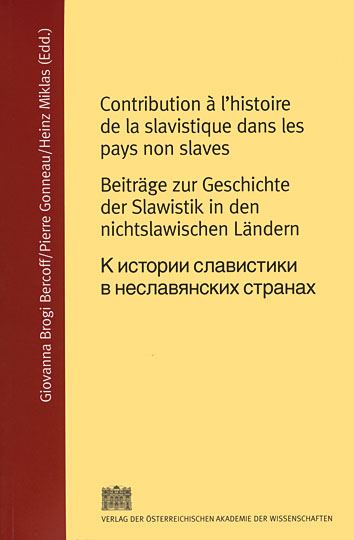
Contribution à l'histoire de la slavistique dans les pays non slaves / Beiträge zur Geschichte der Slawistik in nichtslawischen Ländern
Seiten
2005
Verlag der österreichischen Akademie der Wissenschaften
978-3-7001-3506-7 (ISBN)
Verlag der österreichischen Akademie der Wissenschaften
978-3-7001-3506-7 (ISBN)
- Titel nicht im Sortiment
- Artikel merken
Dieses Buch, das neunzehn Jahre nach den Beiträgen zur Geschichte der Slawistik in nichtslawischen Ländern (Wien, 1985, Schriften der Balkan-Kommission, Linguistische Abteilung, Bd. 30) erscheint, zeugt von der Konzeption von „Slawistik“ oder „Slawenkunde“ und sowie der Erneuerung der Methoden und Interessen hinsichtlich der slawischen Welt, in einer Zeit, da sich Europa in völligem Umbruch befindet. Es behandelt in der Tat außer traditionellen Disziplinen wie Linguistik, Literatur und Geschichte auch Gebiete wie Soziologie, bildende Künste und Theater und legt Rechenschaft von interdisziplinärem Herangehen ab. Während einige Beiträge des vorherigen Bandes nicht weitergeführt oder aber nur teilweise auf den heutigen Stand gebracht werden konnten, sind mehrere bislang nicht behandelte Länder hier nun mit dem ersten Versuch einer Synthese vertreten: Griechenland, Italien, Schweden, die Schweiz, Litauen, Estland und Rumänien. Wiewohl umfassender als der vorhergehende, ist dieser Band ein Torso, nicht das Testament einer abgeschlossenen Epoche oder das Inventar einer Art Museum der Slawistik; in seinen Unvollkommenheiten wie auch Ambitionen zeugt er im Gegenteil von der erstaunlichen Vitalität eines Forschungsgebiets, das seine Ursprünge nicht verleugnet, aber die Gesamtheit der Human- und Sozialwissenschaften einbezieht und dabei keinen Aspekt der Geschichte des Wissens und seiner Erwerbung als etwas Fremdes betrachtet.
…
This volume, published nineteen years after the “Contributions on the History of Slavic Studies in Non-Slavic Countries” (“Beiträgen zur Geschichte der Slawistik in nichtslawischen Ländern”, Vienna, 1985, Schriften der Balkankommission, Linguistische Abteilung, Bd. 30), is witness to the changing concept of “Slavic Studies” as well as the reforms in methods and interests in regard to the Slavic world in a period in which Europe finds itself in massive transformation. In addition to traditional disciplines such as linguistics, literature and history, areas such as sociology, the fine arts and theatre and other interdisciplinary subjects are also dealt with. Although some of the contributions in the earlier volume have not been continued or have only been partially brought up to date, several countries that were not included are now represented with the first attempt at a synthesis: Greece, Italy, Sweden, Switzerland, Lithuanian, Estonia and Rumania. Though more comprehensive than the first volume, the second volume is a torso and not the testament of a finite period or the inventory of a “Museum of Slavic Studies”. In its imperfection but ambitiousness, it displays the astonishing vitality of a discipline that doesn’t forsake its origins, but incorporates all the humanities and social sciences, not holding any aspect of the history of knowledge and its study as superfluous.
…
This volume, published nineteen years after the “Contributions on the History of Slavic Studies in Non-Slavic Countries” (“Beiträgen zur Geschichte der Slawistik in nichtslawischen Ländern”, Vienna, 1985, Schriften der Balkankommission, Linguistische Abteilung, Bd. 30), is witness to the changing concept of “Slavic Studies” as well as the reforms in methods and interests in regard to the Slavic world in a period in which Europe finds itself in massive transformation. In addition to traditional disciplines such as linguistics, literature and history, areas such as sociology, the fine arts and theatre and other interdisciplinary subjects are also dealt with. Although some of the contributions in the earlier volume have not been continued or have only been partially brought up to date, several countries that were not included are now represented with the first attempt at a synthesis: Greece, Italy, Sweden, Switzerland, Lithuanian, Estonia and Rumania. Though more comprehensive than the first volume, the second volume is a torso and not the testament of a finite period or the inventory of a “Museum of Slavic Studies”. In its imperfection but ambitiousness, it displays the astonishing vitality of a discipline that doesn’t forsake its origins, but incorporates all the humanities and social sciences, not holding any aspect of the history of knowledge and its study as superfluous.
| Erscheint lt. Verlag | 6.10.2005 |
|---|---|
| Reihe/Serie | Schriften der Balkankommission ; 46 |
| Verlagsort | Wien |
| Sprache | englisch; französisch; deutsch; russisch |
| Maße | 170 x 240 mm |
| Gewicht | 870 g |
| Einbandart | Paperback |
| Themenwelt | Geisteswissenschaften ► Sprach- / Literaturwissenschaft ► Literaturwissenschaft |
| Geisteswissenschaften ► Sprach- / Literaturwissenschaft ► Slavistik | |
| Schlagworte | Geschichte • Hardcover, Softcover / Slawische Sprachwissenschaft, Literaturwissenschaft • HC/Slawische Sprachwissenschaft, Literaturwissenschaft • Nichtslavische Länder • Slavistik • Sprachwissenschaft |
| ISBN-10 | 3-7001-3506-8 / 3700135068 |
| ISBN-13 | 978-3-7001-3506-7 / 9783700135067 |
| Zustand | Neuware |
| Haben Sie eine Frage zum Produkt? |
Mehr entdecken
aus dem Bereich
aus dem Bereich
Buch | Softcover (2020)
Beuth (Verlag)
19,90 €


